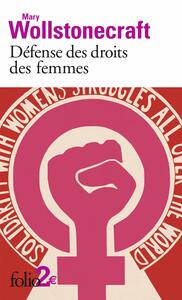You need to sign in or sign up before continuing.
Take a photo of a barcode or cover
Not exactly light reading, this first 'feminist' writing in history. Mary Wollstonecraft (1759-1797) wrote this long essay in 1792 in a style and terminology that is not always easily accessible to us any more, and that is logical, due to the more than 2 centuries that separate her from us. At times the line of argument is forceful, it often deviates from the proposed route, and it involves quite a bit of repetition. But of course Wollstonecraft's fiery combativeness is very recognizable. There is particular indignation at the inferior fate of women in her time, at the derogatory attitude of men towards women, and at the wrong attitude of women themselves who cultivate their own weakness. The writing testifies to an independent, critical mind with a sharp pen.
Her plea is primarily one for an at least equal education of women, so that they can judge and act for themselves through the use of reason. Reason and education are typical themes of the Enlightenment, of which Wollstonecraft is definitely an epigone. The reason for this essay (more like an extended letter) was the evolution of the French Revolution, which was then just in one of its first phases and which aroused enormous expectations worldwide; Wollstonecraft certainly was among the supporters of the radical changes in France, but she was particularly disappointed by a proposed educational reform in which it was not considered necessary to include women; and that was the direct occasion for her essay.
It has been written several times: Wollstonecraft does not argue for the absolute equality of men and women. She repeatedly emphasizes the differences between the sexes and in some passages she even suggests that male dominance may be willed by God and therefore inevitable. And another one: giving women a proper education would benefit the man that marries such a woman. So, clearly, Wollstonecraft was a child of her time ànd class. Does that detract from her feminism? I don't think so, because the common thread in this essay is clearly the plea for equality (in virtue), and it also contains arguments for political, social and economic independence.
Two things that really struck me besides the feminist theme. The constant (and justified) attacks against Jean-Jacques Rousseau who believed that women should not receive a proper education at all (I still don't understand the pedagogues' infatuation with Rousseau). And especially the very fierce attacks against monarchy and despotism. This Vindication and other writings by Wollstonecraft are known as striking expressions of republicanism. Another reason to give attention to it, but - as said - a tough read.
Her plea is primarily one for an at least equal education of women, so that they can judge and act for themselves through the use of reason. Reason and education are typical themes of the Enlightenment, of which Wollstonecraft is definitely an epigone. The reason for this essay (more like an extended letter) was the evolution of the French Revolution, which was then just in one of its first phases and which aroused enormous expectations worldwide; Wollstonecraft certainly was among the supporters of the radical changes in France, but she was particularly disappointed by a proposed educational reform in which it was not considered necessary to include women; and that was the direct occasion for her essay.
It has been written several times: Wollstonecraft does not argue for the absolute equality of men and women. She repeatedly emphasizes the differences between the sexes and in some passages she even suggests that male dominance may be willed by God and therefore inevitable. And another one: giving women a proper education would benefit the man that marries such a woman. So, clearly, Wollstonecraft was a child of her time ànd class. Does that detract from her feminism? I don't think so, because the common thread in this essay is clearly the plea for equality (in virtue), and it also contains arguments for political, social and economic independence.
Two things that really struck me besides the feminist theme. The constant (and justified) attacks against Jean-Jacques Rousseau who believed that women should not receive a proper education at all (I still don't understand the pedagogues' infatuation with Rousseau). And especially the very fierce attacks against monarchy and despotism. This Vindication and other writings by Wollstonecraft are known as striking expressions of republicanism. Another reason to give attention to it, but - as said - a tough read.
reflective
medium-paced
Graphic: Misogyny, Sexism
Liked the beginning. Went strong until we hit the last couple chapters, then it got weird.
challenging
emotional
funny
hopeful
informative
reflective
medium-paced
This is a clear and articulate essay on the benefits of providing women with the same education and rights as men at a time when such thoughts were unheard of and bordering on blasphemous. Wollstonecraft gives logical and rational arguments as for treating men and women equally, not just treating women as equals to men but also treating men as equals to women, which at the time of writing had huge implications for marriage practices and modesty in both personal and public lives. This is well thought out and surprisingly easy to read given that it is over two hundred years old and rather worryingly still has some relevance today. While many have described this as a feminist work I think the fact that Wollstonecraft talks about equality from both sexes takes this work beyond that label and aims for circumstances where there are no differences in they are educated and the rights they receive. So its not just about changes for women but for men too.
challenging
hopeful
informative
reflective
medium-paced
Mary Wollstoncraft the woman you are (were).
She ATE him up left no crumbs. RIP Mary Wollstonecraft you would’ve loved the Barbie movie
informative
inspiring
reflective
medium-paced
informative
reflective
slow-paced






